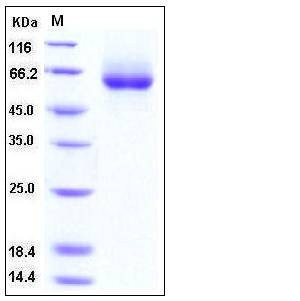Human ENPP7 / NPP-7 Protein (His Tag)
ALK-SMase,E-NPP7,NPP-7,NPP7
- 100ug (NPP3826) Please inquiry
| Catalog Number | P10885-H08H |
|---|---|
| Organism Species | Human |
| Host | Human Cells |
| Synonyms | ALK-SMase,E-NPP7,NPP-7,NPP7 |
| Molecular Weight | The secreted recombinant human ENPP7 comprises 429 amino acids with a predicted molecular mass of 49 kDa. As a result of glycosylation, rh ENPP7 migrates as an approximately 55-60 kDa band in SDS-PAGE under reducing conditions. |
| predicted N | Ala 22 |
| SDS-PAGE |  |
| Purity | > 95 % as determined by SDS-PAGE |
| Protein Construction | A DNA sequence encoding the human ENPP7 (NP_848638.2) (Met 1-Ser 439) was fused with a C-terminal polyhistidine tag. |
| Bio-activity | |
| Research Area | |
| Formulation | Lyophilized from sterile PBS, pH 7.4 1. Normally 5 % - 8 % trehalose and mannitol are added as protectants before lyophilization. Specific concentrations are included in the hardcopy of COA. |
| Background | Mouse Ectonucleotide pyrophosphatase / phosphodiesterase family member 7, also known as Alkaline sphingomyelin phosphodiesterase, Intestinal alkaline sphingomyelinase, Alk-Smase, ENPP7 and NPP-7, is a single-pass type I membrane protein which belongs to the nucleotide pyrophosphatase / phosphodiesterase family. ENPP7 / NPP-7 is expressed in the intestines and human bile. ENPP7 / NPP-7 is localized at the surface of the microvillar membrane in small intestine enterocytes, as well as in endosome-like structures and in Golgi complex. The main function of ENPP7 / NPP-7 is to convert the dietary sphingomyelin into ceramide, the sphingolipid messengers via hydrolyzation. ENPP7 / NPP-7 is also reported to exert a phospholipase C activity toward palmitoyl lyso-phosphocholine. The activity of this enzyme is inhibited in a dose dependent manner by ATP, imidazole, orthovanadate and zinc ion. Further, It has been shown in studies that decreased levels of ENPP7 / NPP-7 may be associated with human colon cancer. |
| Reference |
